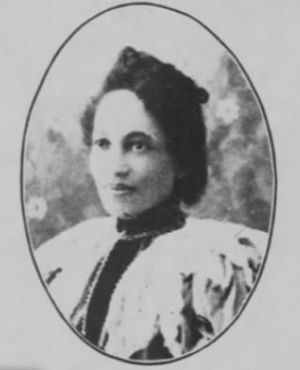Cornelia Bowen facts for kids
Cornelia Bowen (1865-1934) was an amazing African American teacher and school founder from Alabama. She was part of the very first group to graduate from the famous Tuskegee Institute. After her training, she went on to create two important schools: the Mount Meigs Colored Institute and the Mt. Meigs Negro Boys' Reformatory.
Cornelia Bowen believed in teaching students practical skills. She wanted them to learn how to support themselves and their communities. She was also a leader in women's groups, serving as an officer in both state and national Colored Women's Federated Clubs. Later, she became the first woman president of the Alabama Negro Teacher's Association.
Contents
Who Was Cornelia Bowen?
Cornelia Bowen was born on September 24, 1865, near Tuskegee, Alabama. Her family lived on a large farm. When she was a child, a white woman taught her to read using special books called McGuffey Readers.
In 1881, the Tuskegee Normal School opened. Cornelia passed the entrance exam and joined the school. She worked very hard and graduated in 1885. She was in the first-ever graduating class and even won a special medal for being an excellent student!
How Did Cornelia Bowen Start Her Career?
After graduating, Cornelia Bowen first worked as a principal at a training school within Tuskegee Normal School. Later, her mentor, Booker T. Washington, told her about a chance to start a new school. This opportunity was in a place called Mt. Meigs, Alabama.
When Cornelia arrived in Mt. Meigs, she saw that the community was very poor. Many families were farmers who struggled to grow enough food. The local school was only open for three months a year, and most children couldn't read. Cornelia knew she had to help.
Building a Community School
Cornelia started by organizing a Sunday school to teach people. Then, she visited families door-to-door to build trust. She invited mothers to meetings where they could learn about raising children.
She created a community center where women and girls learned cooking, housekeeping, and sewing. They also learned about good health and nutrition. For men and boys, she taught them how to be better farmers and the benefits of owning their own land. She led by example, renting land herself and showing how to grow crops successfully.
Cornelia borrowed money to build a two-story school building. This became a boarding and day school. The community worked together to pay back the debt in just seven years! Besides regular subjects like reading and math, Cornelia taught practical skills. Students learned farming, gardening, and how to raise animals like bees and chickens.
Continuing Her Education and Fundraising
Every summer, Cornelia Bowen traveled north to raise money for her school. She also used these trips to continue her own education. She studied at Teachers College, Columbia University in New York City. She also attended Queen Margaret College (Glasgow) in Scotland.
She earned a bachelor's degree from Straight College and a master's degree from Battle Creek College. Her master's paper was about young people and crime among African Americans in Alabama. She believed that good health, exercise, and sports were important for everyone.
What Was Cornelia Bowen's Impact?
Cornelia Bowen was a founding member of the Afro-American Women's League in 1896. This was a very important group for African American women. By 1904, she was a key leader in the organization. She also became president of the Alabama State Colored Women's Federated Clubs, serving for over ten years.
She spoke at many conferences across the United States. In 1905, she wrote a short book about her life called A Woman's Work. She used her connections with these women's groups to help African Americans and raise money for her school. She also wrote many articles and poems.
Founding the Boys' Reformatory
In 1906, Cornelia and the women's clubs saw a big need for a special school for boys who had gotten into trouble. While there were schools for white boys, there were none for black youth. The clubs asked the state government for help, but they didn't get it.
So, Cornelia sold the club twenty acres of land. The black clubwomen then built a new facility themselves! This second school taught boys using the same practical farming principles as her first institute. They kept asking the Alabama government to take over the school. Finally, in 1911, the state agreed to manage the Alabama Reform School for Juvenile Negro Law-Breakers. Cornelia continued to serve as a trustee for the school for many years. She even taught there until 1923. One of her famous students was the baseball legend Satchel Paige!
In 1920, Cornelia gave the remaining 400 acres of the Mount Meigs Institute to the state of Alabama. She continued to be the principal even after the school's name changed to the Montgomery County Training School around 1923 or 1924. She served as principal until at least 1929. She also taught for five years at the Alabama State Teachers College. In 1927, she made history again by becoming the first woman president of the Alabama Negro Teacher's Association.
Cornelia Bowen's Lasting Legacy
Cornelia Bowen passed away in July 1934 in Mount Meigs, Alabama. Her generosity and hard work continued to help people long after her death. She donated much of the land for the schools to the state.
Both schools she founded are still helping students today! The Institute is now known as Georgia Washington High School. The Reformatory is known as Mount Meigs Campus. Cornelia Bowen's dedication to education and community development left a powerful and lasting mark.
Images for kids
 | James Van Der Zee |
 | Alma Thomas |
 | Ellis Wilson |
 | Margaret Taylor-Burroughs |




